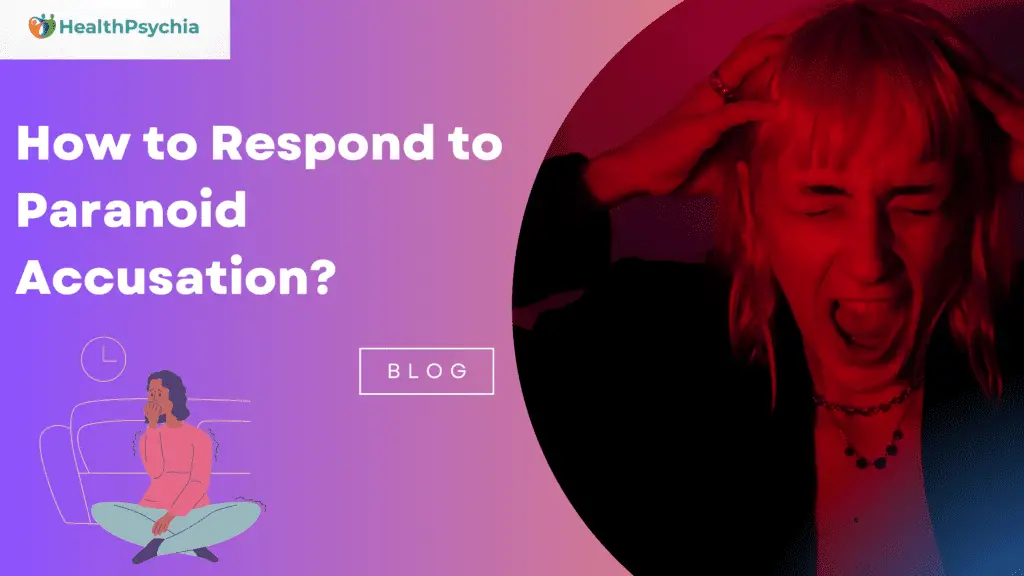Are you thinking about a challenging situation like “How to respond to a paranoid accusation?” A person having an accusation experiences multiple intensive situations, such as anxiety and disturbance.
At that time, you should discover the best-responding ways for paranoid Acquisition.
Here are some tips that you should follow to respond to paranoid accusations.
For more details read: GUIDE TO MENTAL HEALTH – MANAGING MENTAL ILLNESS
Tips to Deal With Paranoid Accusation
Listen Carefully & Remain Calm
It is challenging to stay levelheaded during a discussion with a suspicious person. Take a deep breath and hold on to your emotions.
Listen carefully to them and use techniques for dealing. It is essential to understand the client’s critical thinking process.
Create Boundary
Communicating your expectations that “what you will and will not tolerate.” It is an excellent way to set boundaries. You can do this calmly and respectfully without blaming others.
Establishing clear limits on what type of behavior you will accept.
Make Simple Language
Treat them empathetically. If you argue even rationally, they never make sense and overreact to you. On their aggressive reaction, leave the discussion.
It would help if you left them for a while. Indeed, you should talk empathetically and normalize their behavior.
As you can say
- I also feel like you but am not as fearful as you seem.
- It sounds like you are very careful, but being afraid can express your feelings to others
Narrating Your Action for a Trustworthy Relationship
Your activities may cause paranoid people to be suspicious. It is a barrier to getting responses to the paranoid accusation.
It would help if you built loyal relationships by using different statements, as mentioned below.
- I am here to help you. Just look at me. I have no harmful material. So you can trust me.
- Now watch. I’ll call your mother. You can listen to my call.
The Environment Should be Calm
The clinic environment should be peaceful and calm. Try to avoid the given to a paranoid accusation.
- Keep your clinic noise-free
- Clinic walls should be soft in color.
- The required distance should be present between the client and the patient
- Only add something that catches the client’s attention.

Respect Their Space
Sometimes, paranoid people want space during therapy. At that time, you should respect this space and never connect again unless the patient requests you.
If you don’t wait, he will never continue treatment and consider you his enemy.
Do not take their Acquisition Personally
During a paranoid discussion, he may lash you out. It would help if you did not take it personally.
You should behave politely.
If they attack you, call for help as soon as possible.
Note: Before responding to Paranoid accusation. You should know about Paranoid personality Disorder and its Diagnosis. Do not worry. Stay with us and learn more.
Paranoia Disorder
Clinically, a paranoia person is an over thinker. He feels that someone harm them with no evidence. Their minds become super suspicious, with little reason.
They are entirely sure about their feeling and thinking. These types of thoughts are delusional form.
Paranoia disorder is a complicated mental health problem that can have a big effect on how a person sees the world and how they live their daily lives.
People with paranoia disorder have a strong and irrational fear of others, so they often see harmless situations as threats.
For example
- Paranoia continuously feels that people are observing him.
- If any person makes nasty comments. They believe that people hate them.
How to respond to a paranoid person?
Navigating interactions with a paranoid individual requires a delicate approach that combines empathy and professionalism. When faced with a paranoid person, it’s essential to keep the following strategies in mind that how to respond to a paranoid person?
1. Stay Calm: Maintaining a composed and calm behavior is important when dealing with someone who is paranoid. It helps create an environment of trust and understanding.
2. Listen Actively: Active listening is a powerful tool. By paying close attention to their concerns, asking open-ended questions, and providing empathetic responses. In this way you can make the individual feel heard and valued.
3. Provide Reassurance: Paranoia often stems from irrational fears and uncertainties. To address these concerns, offer clear, factual information or evidence that can help dispel their worries and provide a sense of security.
4. Avoid Dismissal: When someone has paranoia, it’s essential to be respectful of their feelings. It’s important to avoid dismissing or making fun of their fears because it can make them feel even more anxious and distrustful. It’s crucial to validate their feelings and show that you understand them.
The involvement of mental health experts can be particularly beneficial. These professionals can offer diagnosis, treatment and therapy to help the individual manage their condition effectively.
Paranoia Symptoms
- Doubting about people’s trust.
- Always thinking that people are deceiving them.
- Think that people will use his personal information against them.
- Never forgive and hold a grudge.
- They are oversensitive.
- They create unexpected hidden meanings of discussion or things.
- Feel persistent suspicious, even their spouses.
- Always feel jealousy in their relationship.
- Due to their delusional thinking, they always consider themselves right.
- Unable to relax their mind.
- Having the qualities of argumentative, hostile, and stubborn
Most of the time, paranoia disorder is treated with a mix of psychotherapy, medication, and help from friends and family.
Cognitive-behavioral therapy (CBT) can help people question their irrational views and come up with ways to deal with their problems.Getting better requires building a strong support network and making a safe atmosphere.
Note:
You should meet the above criteria to confirm whether a person is paranoid. After that, use the diagnostic personality tests mentioned below.

How to deal with Paranoia?
Dealing with paranoia requires a multifaceted approach. It is important to seek professional help for an accurate diagnosis and treatment options, which may include therapy and medication. Building a support network, managing stress and maintaining a healthy lifestyle can contribute to better mental health. Educating yourself or the affected individual about the condition can provide a greater sense of control.
In severe cases, it is crucial to ensure safety by removing access to potential harm. Regular monitoring by mental health professionals is necessary to assess progress and adjust treatment plans. Compassion and patience are vital in addressing this complex and challenging condition. Understanding and support play a significant role in the recovery process.
Paranoid Personality Disorder Test
Here is a valid paranoid personality disorder test usually used for the diagnosis
- Psycom’s Paranoid Personality Disorder Test
However, the other personality assessment test can also help diagnose. Here is the list of personality tests.
- TAT Thematic Apperception test
- Minnesota Multiphasic Personality Inventory (MMPI)
Conclusion
Hope you can understand “How to Respond to Paranoid Accusations.” It is hard to deal with any personality disorder due to personality factors.
However, based on the given instructions, you can deal with personality problems.
Frequently Ask Questions
Q1. What is PPD disorder?
Ppd is a paranoid personality disorder. A long-term mental illness causes a person to have distrust and suspiciousness issues.
These problems may diminish their health and never interact with society. They are unable to carry everyday life.
Q2. If you love someone with a paranoid personality disorder?
Follow these tips
- Respect their beliefs, but do not share them about their illness.
- Try to help them in a difficult time
- Help to cope with their problem.
- Avoid criticizing them.
- Create positivity and practice self-care.
- Don’t isolate them
Q3. How many types of personality disorder?
Here is the classification of personality disorder.
| CLUSTERS | TYPES OF PERSONALITY DISORDERS |
| Cluster A | Paranoid Personality Disorder |
| Schizoid Personality Disorder | |
| Schizotypal Personality Disorder | |
| Cluster B | Antisocial Personality Disorder |
| Borderline Personality Disorder | |
| Histrionic Personality Disorder | |
| Narcissistic Personality Disorder | |
| Cluster C | Avoidant Personality Disorder |
| Dependent Personality Disorder | |
| Obsessive- Compulsive Personality Disorder |
Q.4 Write four main types of personalities?
A study proves that these main types of personalities
- Average
- Reserved
- Central
- Role model


